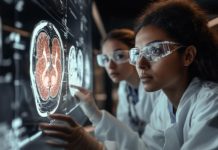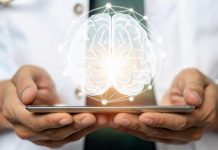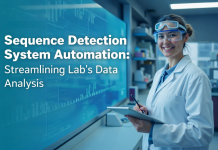The healthcare industry is currently undergoing a profound transformation, driven by the rapid advancements in data science. By leveraging large datasets and applying sophisticated analytical techniques, data science is unlocking new possibilities in patient care, diagnosis, and treatment. Importantly, this evolving field is not only enhancing the quality of healthcare. It is also making it more accessible and personalized for patients worldwide.
This article delves into the various ways data science is revolutionizing the healthcare sector. Furthermore, it explores the exciting future trends that promise even more groundbreaking changes in the industry.
Key Takeaways
- Data Science is transforming healthcare by improving patient care, diagnosis, and treatment through advanced analytics.
- The rise of Data Science is driven by vast health datasets, enabling better diagnostic techniques and precision medicine.
- Predictive analytics identifies risks and enhances preventive care by revealing health trends and community needs.
- Data Science also optimizes healthcare operations, from scheduling to resource management, improving efficiency and reducing costs.
- Future trends include natural language processing and blockchain technology, enhancing data interpretation and security in healthcare.
Table of Contents
The Rise of Data Science in Healthcare
The integration of data science in healthcare is not a novel concept, but its significance has exploded over the past few years. The availability of vast amounts of health-related data, such as electronic health records (EHRs), genomic data, and patient-generated information, has paved the way for groundbreaking research and innovation. Moreover, data science enables healthcare professionals to analyze these datasets. They can then uncover patterns and correlations that were previously undetectable. As a result, this is leading to improved diagnostic techniques. It is also supporting more effective treatment plans and proactive health management strategies.
One of the significant factors contributing to the rise of data science in healthcare is the development of advanced computing power and machine learning algorithms. These tools allow for the processing and interpretation of complex datasets in real-time. As a result, they provide healthcare professionals with critical insights. These can be applied in clinical settings. Consequently, data-driven decision-making is becoming a cornerstone of modern healthcare. It enables practitioners to deliver care that is both precise and tailored to individual patient needs.
Enhancing Diagnostic Accuracy
Data science is playing a crucial role in enhancing diagnostic accuracy across various medical fields. By harnessing artificial intelligence (AI) and machine learning algorithms, healthcare providers can now interpret medical images, such as X-rays, MRIs, and CT scans, with unparalleled accuracy. Furthermore, these technologies are designed to recognize complex patterns and anomalies that may not be immediately apparent to the human eye. As a result, they significantly improve the early detection of diseases like cancer and cardiovascular conditions.
Moreover, predictive analytics, another application of data science, is aiding in identifying patients at risk of developing chronic diseases. By analyzing historical data and identifying key risk factors, healthcare professionals can implement preventive measures and interventions. These can mitigate the progression of these diseases. Therefore, this shift from reactive to proactive care is a testament to how data science is not only enhancing diagnostic capabilities. It is also making preventive healthcare a reality.
Transforming Patient Care
The application of data science extends beyond diagnostics, significantly transforming the way patient care is delivered. Personalized medicine is a care approach tailored to a patient’s genetic makeup, lifestyle, and environment. It is becoming increasingly feasible due to data science. By analyzing genomic data, healthcare providers can develop bespoke treatment plans. These plans optimize efficacy and minimize adverse effects. In turn, this personalized approach ensures that patients receive treatments that are most compatible with their unique profiles. Thus, it improves overall outcomes.
In addition to personalized medicine, data science is facilitating patient monitoring and management through wearable technologies. Devices such as smartwatches and fitness trackers collect data on vital signs, physical activity, and even sleep patterns. This information can be transmitted to healthcare providers in real-time, enabling continuous monitoring and timely interventions. Such innovations empower patients to take an active role in their health and promote a collaborative approach to care. In this model, providers and patients work hand in hand. Similarly, in planning for the future and navigating legal responsibilities, services like Probate Arizona can help ensure that essential matters are managed accurately and efficiently.
Impact on Healthcare Operations
Beyond direct patient care, data science is revolutionizing healthcare operations by optimizing various administrative processes. Hospitals and clinics are utilizing data analytics to improve scheduling, resource allocation, and inventory management. By predicting patient inflow and outflow trends, healthcare facilities can manage their resources more efficiently. In turn, they can reduce wait times and enhance patient satisfaction.
Furthermore, predictive modeling is aiding in staff management by ensuring that the right number of healthcare professionals is available at all times. This not only boosts operational efficiency but also minimizes burnout among healthcare workers, contributing to a more sustainable work environment. As data science continues to evolve, it is anticipated that these operational efficiencies will lead to significant cost savings across the healthcare sector.
Ensuring Data Privacy and Security
With the increasing reliance on data science comes the critical need to safeguard patient data privacy and security. As sensitive health information is collected, stored, and analyzed, healthcare institutions must adhere to stringent data protection regulations. Additionally, they must implement robust security measures. Therefore, data encryption, access controls, and continuous monitoring are essential to protect against unauthorized access and potential data breaches.
Additionally, implementing ethical guidelines for data usage and fostering transparency with patients about how their data is used are vital steps in maintaining trust. As the field of data science continues to push boundaries, ensuring the privacy and security of patient data will remain a top priority for the industry. Tools such as a donor kiosk also highlight how secure technology can streamline sensitive processes, offering convenience while upholding privacy standards.











